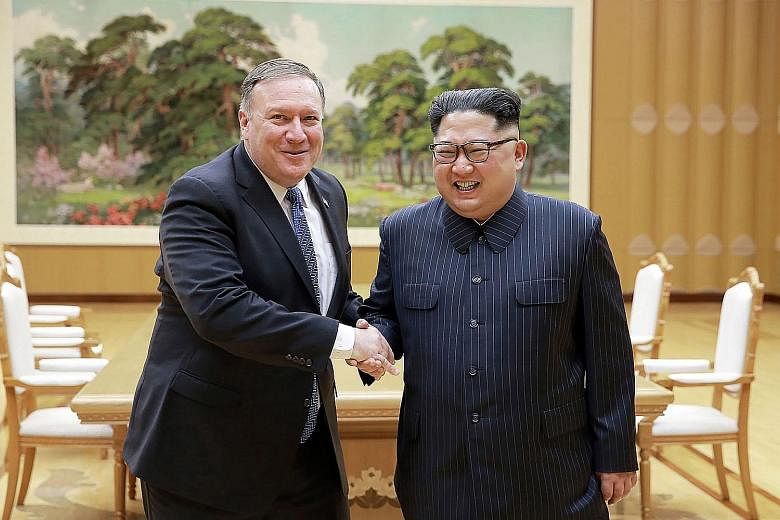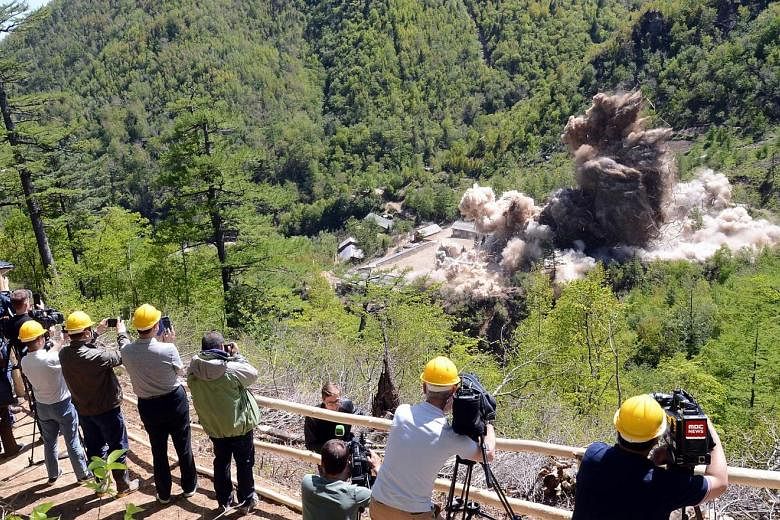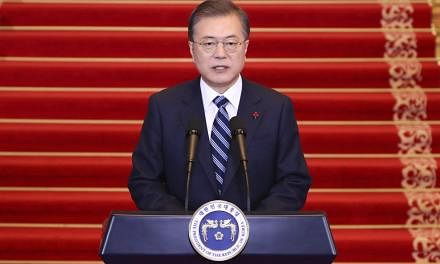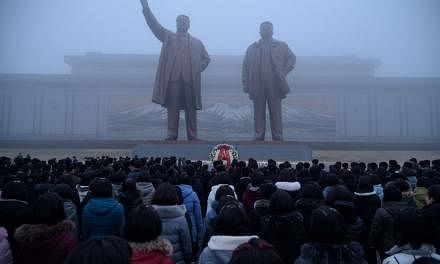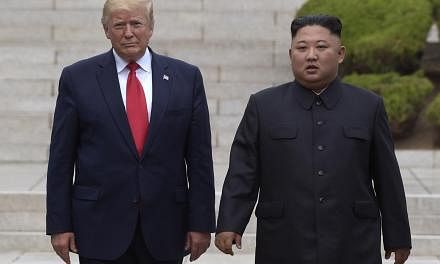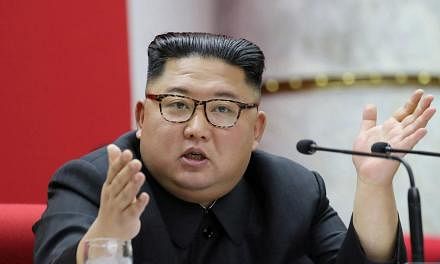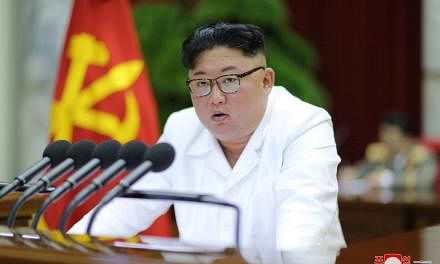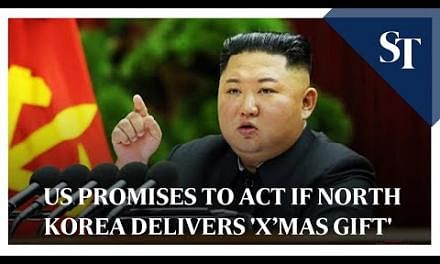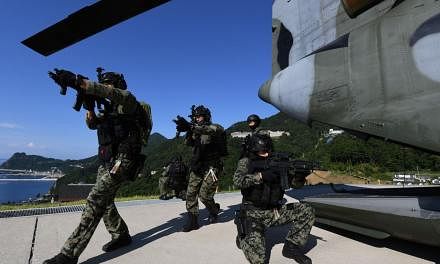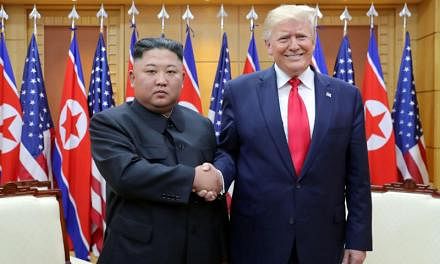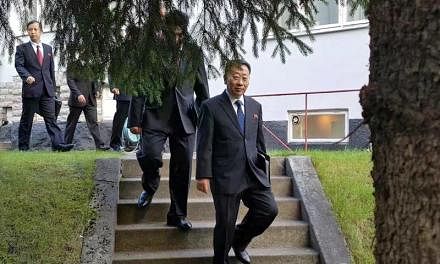WASHINGTON • The historic nuclear disarmament summit between Mr Donald Trump and North Korean leader Kim Jong Un - the one that Mr Trump thought might earn him the Nobel Peace Prize - crumbled nearly as quickly as it came together, in a sudden and startling decision by the US President.
Inside the White House, the first alarm sounded at about 10pm on Wednesday when National Security Adviser John Bolton told Mr Trump about North Korea's public statement threatening a "nuclear-to-nuclear showdown", and mocking Vice-President Mike Pence as a "political dummy".
The President was dismayed by Pyongyang's bellicose rhetoric, the same theatrics Mr Trump often deploys against his adversaries.
Mr Bolton advised him that the threatening language was a very bad sign, and the President told advisers that he was concerned Mr Kim was manoeuvring to back out of the summit and make Americans look like desperate suitors, according to a person familiar with the conversations.
So, Mr Trump called it off first.
The result was a crushing disappointment for a President eager to achieve a peace accord with North Korea that his recent predecessors had failed to reach.
The announcement of the summit and its cancellation were both based on gut decisions by Mr Trump, and had their origins in a visit by South Korean National Security Adviser Chung Eui Yong to Washington on March 8.
Mr Chung brought a message from Mr Kim about his readiness to discuss denuclearisation of the Korean peninsula with Mr Trump.
Mr Trump, convinced that his campaign of "maximum pressure" had forced North Korea to the negotiating table, asked Mr Chung to make a statement to the press outside the White House that he was ready to have dialogue, reported The Guardian.
But it appears that Mr Trump was not clear on what Pyongyang's interpretation of "denuclearisation" meant. For Mr Kim, it implied lengthy negotiations in which North Korea would be treated as a nuclear power and an equal by the United States. To Mr Trump, it meant unilateral disarmament.
The gap in perceptions was papered over by Mr Chung and South Korean President Moon Jae In, who heaped praise on the US President as a wise world leader destined to make history.
Though Mr Trump is hardly the first president to have sensitive diplomatic entreaties fall short, his played out in full public view, like a soap opera narrated daily from the Oval Office.
Mr Tony Schwartz, who co-authored The Art Of The Deal with Mr Trump, said the President scotched the summit to save his ego.
"Trump has a morbid fear of being humiliated and shamed," Mr Schwartz said. "This is showing who is the biggest and the strongest, so he is exquisitely sensitive to the possibility that he would end up looking weak and small. There is nothing more unacceptable to Trump than that."
According to a White House official, after Mr Trump was briefed on North Korea's statement on Wednesday night, he "took it in stride and slept on it".
As dawn broke on Thursday, senior US officials congregated in the West Wing, and by 7am, they were discussing options over the phone with Mr Trump, who was still in his private chambers.
The President arrived at a swift decision to cancel the summit.
He drafted his letter to Mr Kim on Thursday morning as he consulted with top aides, including Mr Bolton, Secretary of State Mike Pompeo and Mr Pence, reported CNN.
A cadre of advisers - including Mr Bolton, Chief of Staff John Kelly, press secretary Sarah Huckabee Sanders, vice-presidential Chief of Staff Nick Ayers, Deputy Chief of Staff Joe Hagin and Deputy National Security Adviser Mira Ricardel - scurried between Mr Ayers', General Kelly's and Mr Bolton's offices, finalising their plan to break Mr Trump's news.
Mr Trump dictated a stern yet wistful personal letter to Mr Kim blaming him for "the tremendous anger and open hostility displayed in your most recent statement".
The note bore Trumpian hallmarks, including flattering the recipient and boasting about the size of his arsenal. "You talk about your nuclear capabilities, but ours are so massive and powerful that I pray to God they will never have to be used," he wrote.
This behind-the-scenes account of Mr Trump's decision to cancel the Singapore summit is based on interviews with seven administration officials, many of whom spoke on condition of anonymity to candidly discuss a sensitive matter.
Mr Trump's move caught South Korea and other allies off guard - in part by design, aides said.
The President feared the news would leak out if foreign counterparts were alerted, though some in the White House were concerned about insulting allies. Foreign diplomats got word that the summit was off at the same time as the general public, shortly before 10am, when the White House sent a copy of Mr Trump's letter to reporters.
At South Korea's presidential Blue House, officials were blindsided. President Moon had just returned home from Washington, where he met Mr Trump on Tuesday, and Mr Moon's national security adviser recently put the chance of the summit happening at 99.9 per cent.
Reached shortly after Mr Trump's letter was released, Blue House spokesman Kim Eui Kyeom said: "We are attempting to make sense of what, precisely, President Trump means."
Mr Trump made his announcement while several American journalists were in North Korea at the invitation of Mr Kim's government to witness the apparent destruction of a nuclear test site.
CNN correspondent Will Ripley, who was reporting from the test site this week, recalled being the one to read the US President's letter to North Korean officials.
"There was just a real sense of shock," Mr Ripley reported on Thursday. "Immediately, they got up and left, and are now on the phone kind of relaying the news up to the top." The moment, Mr Ripley added, was "very awkward and uncomfortable".
Mr Trump's final decision was abrupt, but doubts had been growing for several days, with indications all week that the North Koreans were operating in bad faith.
Even before the decision, US officials had grown concerned that Mr Kim's deputies had gone silent on preparations for the summit.
Mr Pompeo - who travelled twice to North Korea and was regarded inside the Trump administration as the good cop to Mr Bolton's enforcer - blamed Pyongyang for the breakdown in communication in recent days. The US "received no response to our inquiries from them", Mr Pompeo told a Senate panel on Thursday. "We got a lot of dial tones."
US officials were further frustrated last week when a senior North Korean delegation failed to show up for a planning meeting in Singapore, leaving a team led by Mr Hagin with little to do.
"They waited, and they waited," a senior White House official said. "The North Koreans never showed up. The North Koreans didn't tell us anything. They simply stood us up."
US officials interpreted the hardline statements from Pyongyang as also reflecting Mr Kim's concerns about the summit, including his transport options to Singapore.
His fleet of Soviet-era aircraft is untested on long journeys, and it was unclear if the planes could make the 9,656km round trip for the June 12 Singapore summit.
Mr Kim also reportedly harboured fears of being deposed if he left North Korea for a long time.
Some Trump administration officials worried about "losing the upper hand" if Mr Kim strung Mr Trump along and then bailed on the meeting, according to a second senior White House official.
Aides began telling Mr Trump last week that he should be prepared for the summit not to happen, and that it might take several tries before he actually meets Mr Kim face to face.
The move to temper the President's enthusiasm was partially driven by Mr Bolton, as well as several congressional allies.
"Here is what I told the President: North Koreans are going to try to wait you out," Senator Lindsey Graham, a South Carolina Republican, said. "They are going to nickel and dime you. They are going to delay. They are going to obfuscate. They are going to make commitments and pull them back."
WASHINGTON POST
